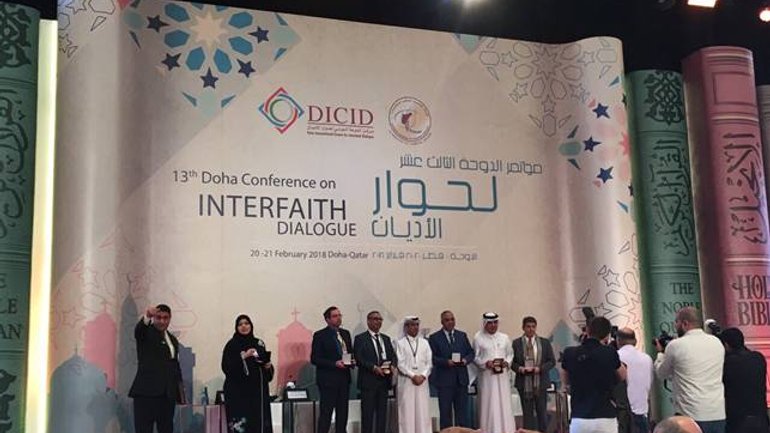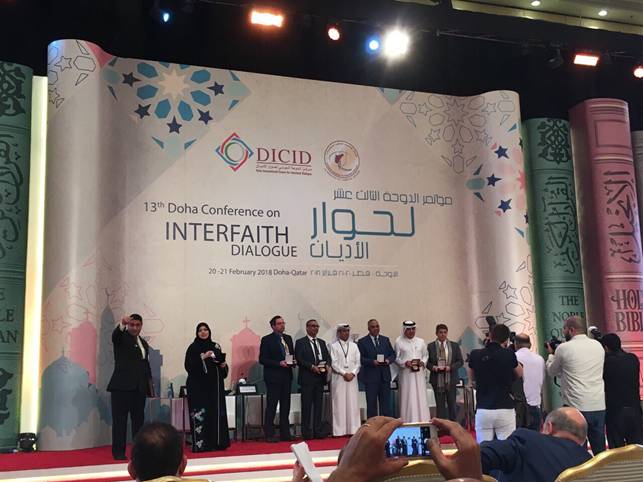Ukrainian delegation participated in the World Conference for Interreligious Dialogue

The 13th World Conference on Interreligious Dialogue, which this year was devoted to the issues of interaction and interdependence of religions and human rights, was held in the capital of Qatar, Doha. The event was hosted by the Doha International Center for Interreligious Dialogue (DICID), which initiates and holds similar events every two years in direct cooperation and with the organizational support of the Ministry of Foreign Affairs of Qatar. Several hundred representatives from about 70 countries, representing practically all religious trends and movements, became participants of the conference.
The 13th World Conference on Interreligious Dialogue, which this year was devoted to the issues of interaction and interdependence of religions and human rights, was held in the capital of Qatar, Doha. The event was hosted by the Doha International Center for Interreligious Dialogue (DICID), which initiates and holds similar events every two years in direct cooperation and with the organizational support of the Ministry of Foreign Affairs of Qatar. Several hundred representatives from about 70 countries, representing practically all religious trends and movements, became participants of the conference.

According to the site of the Ministry of Culture, the Ukrainian delegation at the Forum was represented by Viktor Yelenskyy, MP of Ukraine, the chairman of the parliamentary subcommittee on freedom of conscience of the Committee on Culture and Spirituality of the Verkhovna Rada, Yevgeny Mykytenko, Ambassador of Ukraine to Qatar, representatives of various public and religious organizations - Sheikh Imad Abu Al Rub, the head of the All-Ukrainian Center for Interreligious Dialogue and communications, Sheikh Said Ismagilov, the head of the spiritual administration of Muslims of Ukraine "Ummah", Sayran Arifov, the chairman of the "Allrad", Fr Ihor Shaban, the Head of the Department for Interreligious Dialogue of the Ukrainian Greek-Catholic Church. The Ministry of Culture of Ukraine was represented by Andriy Yurash, Director of the Department for Religions and Nationalities.
During two days of work, the assembly heard and discussed nearly 80 reports and messages that were presented during the five plenary sessions and 15 meetings held in the form of parallel sessions.
Among the topics that became the key ones for the participants as part of the Forum’s general issues, the following should be listed: human rights in the traditions and practices of world religions, freedom of conscience and religious practices, individual rights and public interest, religious views on extremism and terrorism, religious tolerance and denial of religious tolerance.
On behalf of the Ukrainian delegation, Andriy Yurash, Director of the Department of Religious Affairs and Nationalities of the Ministry of Culture of Ukraine, made a presentation at the last plenary session before the official closing ceremony of the Forum, outlining the current challenges related to the activation of religious values in the context of the application of international norms in the area of human rights protection.
In his speech, Andriy Yurash focused the audience's attention on two conceptual approaches to the topics discussed. First, he drew attention to the need for interaction of religious organizations with the state in the implementation of established religious values and initiatives, since for both parties of potential interaction such cooperation creates additional possibilities: religious organizations receive better conditions for effecting their spiritual mission, and through cooperation with religious institutions the state acquires an important spiritual dimension of its practical activity, without which the fulfillment by the state of its own functions cannot be as obvious and understandable to all general public.
Secondly, in the opinion of Andriy Yurash, speaking about and supporting the rise of religious values in contemporary societies, it is necessary to constantly remind religious organizations of the necessity to enhance their responsibility for observance of human rights, in particular, in measuring the realization of the right to free confession of any religion, including the right to discuss any issues concerning the religious domain. When it comes to increasing responsibility of religious organizations, it is imperative to bear in mind the responsibility, both in the dimension and in relation to their own adherents, and to the general public, that is, society, in which each religious organization carries out its spiritual mission and performs the relevant ministry.









